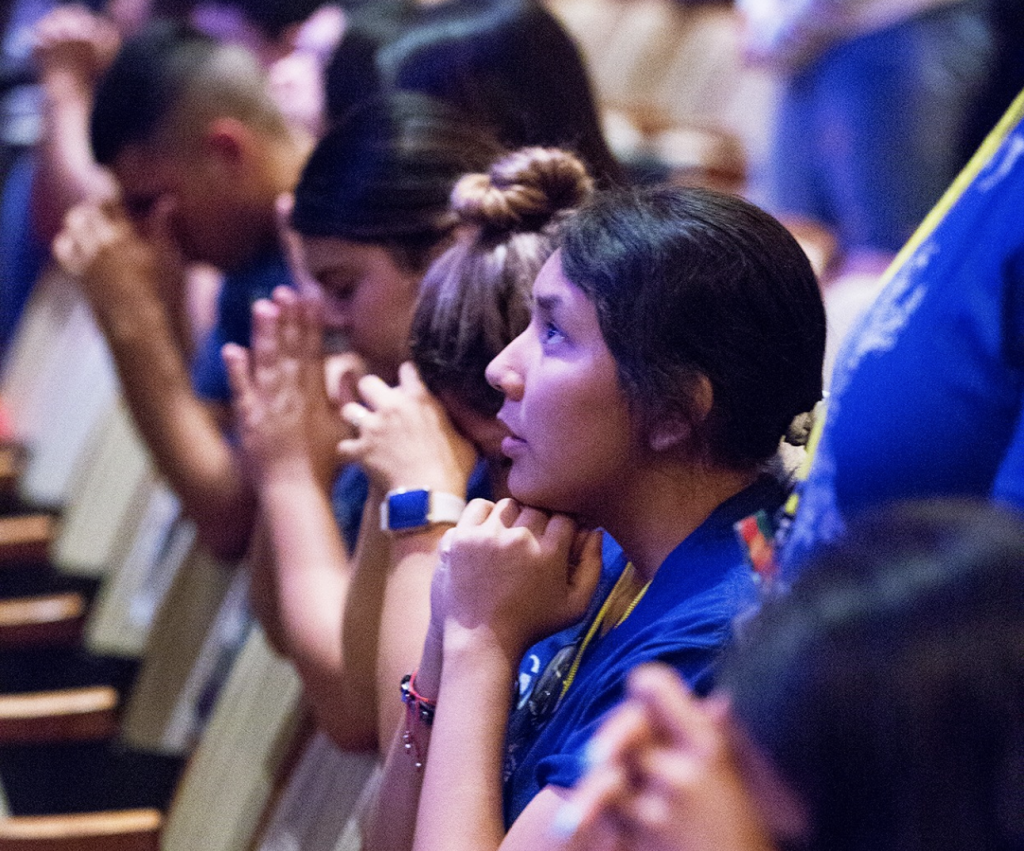If you’ve never had a chance to pray with young people, I want to tell you something: It will break your heart. Then it will make it whole again.
Having been a Catholic youth minister for a few decades, I have had this privilege. Sometimes the prayer is just as goofy and wiggly as they are. Sometimes it’s perfunctory. But often it’s the kind of experience that reminds you just how much young people actually do love God, and it can bring you to your knees with the recognition of just how much God loves them.
I’ve gotten to know the hopes and fears of young people. I’ve had the chance to listen to their dreams and their struggles, and then walked with them as they took those things to prayer. They pray for their families: to be safe, to be healthy, to be whole. They pray that their friends will make good decisions, and be comforted. They pray for their grandparents, and they miss them when they are gone. Maybe if I’d never had that experience I’d be more downcast about young people in the church. But I’m actually pretty hopeful.
I’m hopeful because I see their idealism. Pope Francis in his apostolic exhortation “Christus Vivit” describes the difference between adults and young people this way: “A young person stands on two feet as adults do, but unlike adults, whose feet are parallel, [a young person] always has one foot forward, ready to set out, to spring ahead.” I’m hopeful because the young people I know are like this. They believe that they can build the kingdom of God in ways both large and small. They believe they can make a difference.
One of the ways young people make that difference is through service, and often that service is in partnership with the Church. Through organizations like the Jesuit Volunteer Corps, Mercy Volunteer Corps and many others, young people commit to spending a year living simply in community and serving the poor and marginalized. I’ve seen high school teens from my own parishes serve in center city outreaches and with the rural poor. I’ve watched as the realization dawns that not everyone lives like they do; not everyone has enough. Then I’ve seen how that realization turns into a fierce determination to make things better.
I’m hopeful about young people because I’ve listened to their questions. When they see a lack of compassion or justice in the world or in the Church, they are not afraid to ask hard questions or to make people uncomfortable by raising issues that adults might consider taboo. They make us question — as well we should — why things are the way they are. Why are we settling for less than what God calls us to?
I’m hopeful about young people in the church because I see their gratitude. It is not always expressed consistently or overtly, but when we get to those points of introspection, in prayer and conversation, in times of trouble and joy, you hear it. They are grateful for the love they receive from their families. They recognize the gift that their friends are and they treasure them. They are appreciative of what they have and they know that there are those who go without. They express their appreciation for the helpers in their lives — teachers, mentors, guides.
I’m hopeful about young people and the church because they get it. The clarity of their vision is, at times, startling. I asked a few youth ministry friends what makes them hopeful about young people in the Church. One said he’s hopeful because of “the energy I see in young people for a relationship with Jesus that is not caught up in issues but remains focused on their person and the person of Jesus the Christ.” Another told me for her it’s “their ability to grasp what is true, real and central to our faith. Because of their youth they are more open at times to the Holy Spirit.”
If you’re feeling discouraged about young people in the church I would encourage you to spend some time with them. Or at least spend some time with those who work with them and listen to their stories.
Once you see or hear about them up close it’s hard not to be inspired by their idealism, their service, their questions, their gratitude, their insight, and their faith. I should warn you though — it might make you want to join them!
Nora Bradbury-Haehl is an author, speaker, and a nationally recognized voice in the conversation about young people and the Church. Her book “The Freshman Survival Guide: Soulful Advice for Studying, Socializing, and Everything in Between” is an Amazon bestseller. She’s written for Saint Mary’s Press, BustedHalo.com, and Liturgy Training Publications. She’s been in youth and young adult ministry for more than 25 years and is involved in interfaith work in her hometown of Rochester, New York.
Start your day with Always Forward, our award-winning e-newsletter. Get this smart, handpicked selection of the day’s top news, analysis, and opinion, delivered to your inbox. Sign up absolutely free today!

